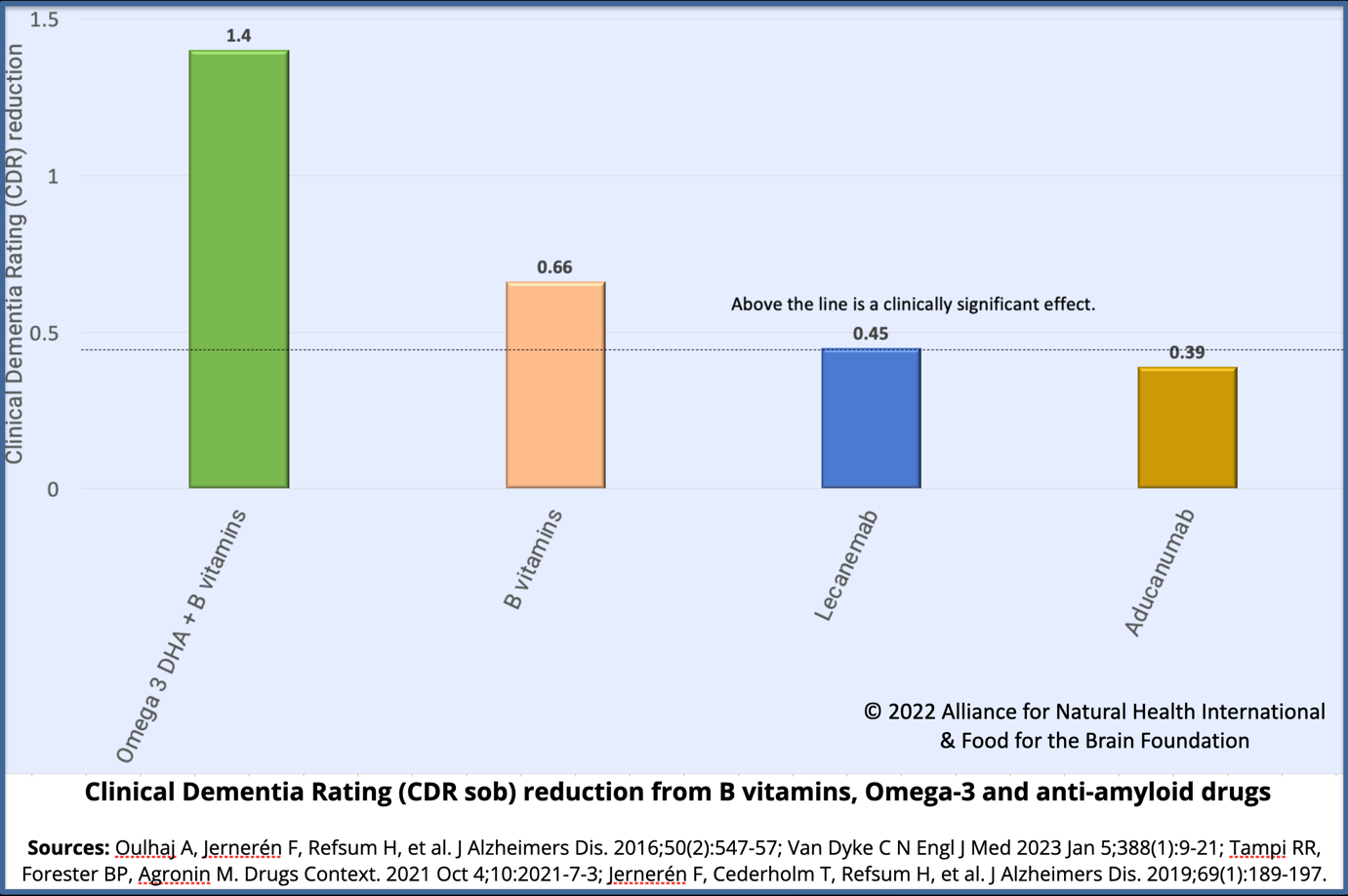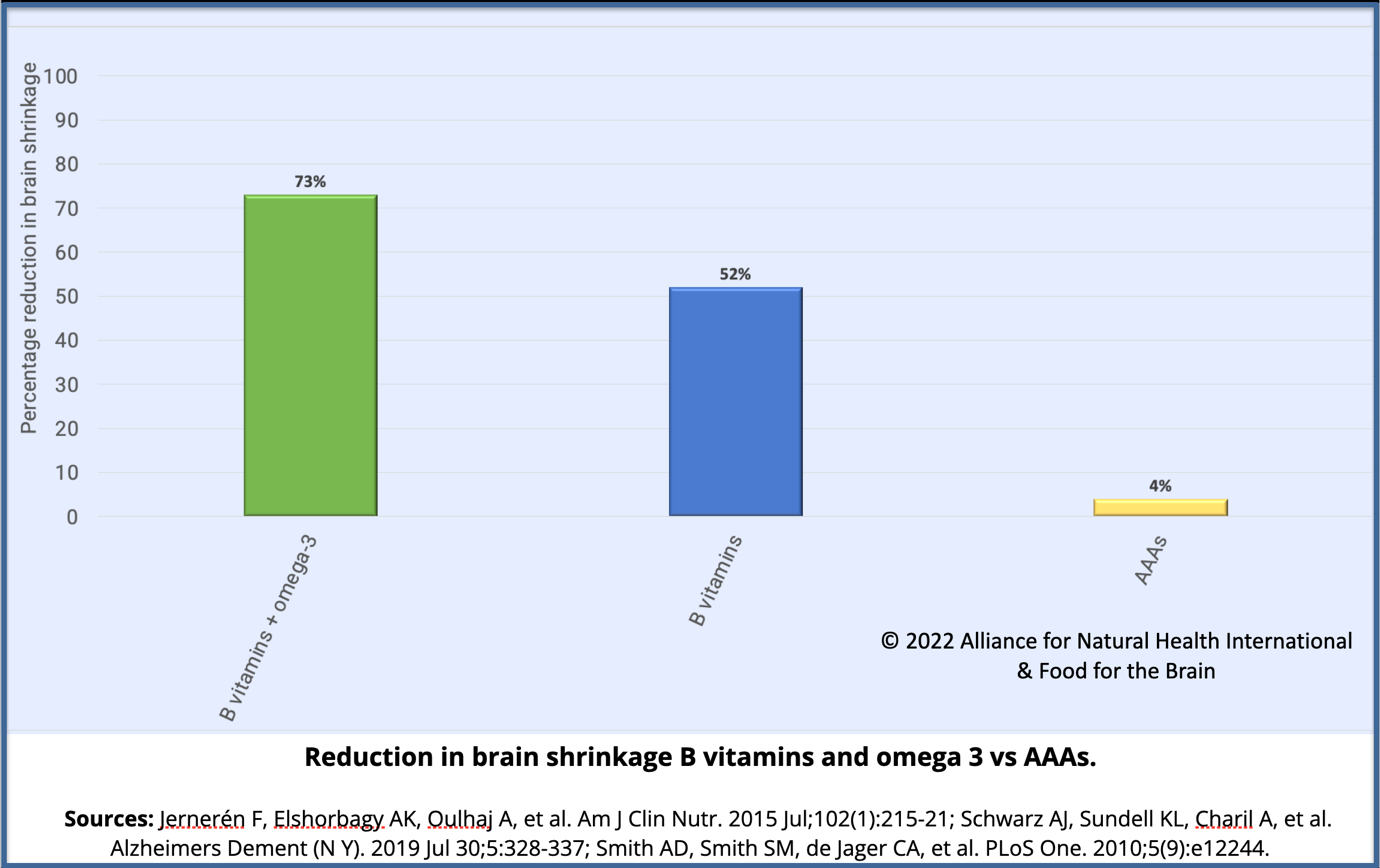The UK’s Bio Bank data showed that something as simple as taking fish oils had reduced dementia risk by 9%. This is equivalent to the risk reduction found from quitting smoking. However, the effect is not the same without B vitamins.
FOOD FOR THE BRAIN (May 20, 2023) New research shows that the combination of B vitamins and omega-3s are a dynamic duo against dementia and stopping the brain shrinkage that is the hallmark of Alzheimer’s.
The discovery, hailed as the “a major step towards Alzheimer’s prevention” was first made at the University of Oxford, but has now been confirmed by research groups in Holland, Sweden and China.
 Headed by Professor David Smith, former Chair of Pharmacology and Deputy Head of the Division of Medical Sciences at Oxford University and director of the Oxford Project to Investigate Memory and Ageing (OPTIMA), the research has found that giving older people with the first signs of cognitive impairment supplemental B vitamins (B6, B12 and folic acid) at higher levels than can be achieved through diet to those with sufficient omega-3 fats produced 73% less brain shrinkage in a year, compared to placebo. This reduction brought brain shrinkage down to the level found in those elderly with no cognitive impairment. Cognitive decline was also significantly slowed in those with high omega-3s who were treated with B vitamins. The trial was part-funded by Alzheimer’s Research UK (ARUK). “The effect is greater than that of any drug treatment to date – with no adverse effects.” says Professor Smith. In contrast, the recent trials of anti-amyloid drugs have reduced brain shrinkage by a non-significant 4%.
Headed by Professor David Smith, former Chair of Pharmacology and Deputy Head of the Division of Medical Sciences at Oxford University and director of the Oxford Project to Investigate Memory and Ageing (OPTIMA), the research has found that giving older people with the first signs of cognitive impairment supplemental B vitamins (B6, B12 and folic acid) at higher levels than can be achieved through diet to those with sufficient omega-3 fats produced 73% less brain shrinkage in a year, compared to placebo. This reduction brought brain shrinkage down to the level found in those elderly with no cognitive impairment. Cognitive decline was also significantly slowed in those with high omega-3s who were treated with B vitamins. The trial was part-funded by Alzheimer’s Research UK (ARUK). “The effect is greater than that of any drug treatment to date – with no adverse effects.” says Professor Smith. In contrast, the recent trials of anti-amyloid drugs have reduced brain shrinkage by a non-significant 4%.
“Brain shrinkage is the hallmark of Alzheimer’s so this was a vital discovery for its prevention” says Patrick Holford, director of the Alzheimer’s Prevention Project at foodforthebrain.org, the UK’s leading dementia prevention charity. “However we needed confirmation from other research groups. Now we have it.”
Three other research groups have confirmed that the combined effect of omega-3s and B vitamins is greater than either nutrient on its own.
“You literally cannot build brain cells without both omega-3 fats and sufficient B vitamins” says Holford. “If you give a builder a hammer or a bag of nails you don’t get a house. But if you give them both they can build a house. The B vitamins drive a process called methylation which assembles the critical brain-building fats that make up the membrane of neurons, through which all brain communication happens. Both are vital for building brain cells. Neither can work without the other.”
Watch this one minute film, on how to build new brain cells at any age.
Realizing that the combination of B vitamins and omega-3 fats is key, researchers in Holland, who had previously run a major trial called ‘B-proof’ that had tested the effects of B vitamins on memory but had only found very modest benefits decided to reanalyze the results of their B vitamin trial according to the participants blood levels of omega-3s at the start of the trial. Sure enough, they found no benefit at all from the B vitamins in those with low omega-3 status, but a big improvement in cognition in those in the top third of omega-3 levels.
Could this need for both explain why some trials testing omega-3s were also not successful?
The Oxford University researchers, led by Dr Frederik Jerneren, were given access to the blood samples from a trial in Sweden called ‘OmegAD’. This trial had given Alzheimer patients a hefty dose of 2.3 grams (two large capsules) of omega-3 fish oils. The trial had apparently failed, showing no significant cognitive benefit. Could faulty methylation, a result of lack of B vitamins, be the reason for the omega-3 fish oils not working?
The Oxford researchers therefore measured homocysteine, a consequence of a lack of B vitamins, in the samples from the OmegAD trial. Dr. Jerneren split the participants into thirds – from the lowest to highest level of homocysteine. Those given omega-3s who had the lowest homocysteine, in other words those who were sufficient in B vitamins, had a highly significant improvement in their clinical dementia rating while those with high homocysteine (poor B vitamin status) had no benefit at all. The group with sufficient vitamin B showed a reduction in their clinical dementia score which was three times that reported in the recent Lecanemab anti-amyloid drug trial.
Meanwhile another trial, this time in China, gave those with pre-dementia either the B vitamin folic acid, or omega-3, or both, compared to placebo. Although B vitamin treatment and omega-3 treatment did slightly improve cognitive cores, the improvement was much greater in those given both the nutrients.
With 170 million people over 65, Chinese authorities are taking prevention of dementia extremely seriously to avoid a cerebral tsunami. So, one of their top researchers, Professor Jin-Tai Yu at Shanghai’s Institute of Neurology at Fudan University carried out one of the most thorough reviews of all risk factors for Alzheimer’s to date.
“Lowering blood homocysteine levels, an established indicator of Alzheimer’s risk, with B vitamins is a most promising treatment.” he concluded. He was also given access to the UK’s Bio Bank data of almost half a million people “Our current research, using data from the UK Bio Bank, shows that having higher blood levels of polyunsaturated fats, including omega-3s, and supplementing fish oils, is associated with less risk of dementia. Moreover, recent studies suggest these two factors – homocysteine lowering B vitamins, and omega-3s – may, in combination, be potentially more beneficial. They are easy to implement. This is worthy of further research.”
The UK’s Bio Bank data showed that something as simple as taking fish oils had reduced dementia risk by 9%. This is equivalent to the risk reduction found from quitting smoking.
US researchers at the National Institutes of Health research have confirmed this, attributing almost a quarter (22%) of Alzheimer’s cases to lack of B vitamins and raised homocysteine levels and the same (22%) to a lack of omega-3s and seafood intake. This means that about one in three cases of Alzheimer’s could be avoided simply by taking a daily high dose B vitamin supplement and an omega-3 fish oil capsule. This could save some 70,000 people a year in the UK from developing dementia. Currently, about 600 people are diagnosed every single day . However, the benefit is not just in preventing people from dementia in the future. A study of healthy 65-year-olds given omega-3 fish oils showed both improvement in memory and healthier brain tissue within six months.
The Alzheimer’s prevention charity, Foodforthebrain.org, targets eight prevention steps in their on-line Cognitive Function test and Dementia Risk Index questionnaire, including taking B vitamins and omega-3s. “These are the two easiest to change and most evidence-based prevention steps anyone can take,” says Patrick Holford who directs their ‘Alzheimer’s is Preventable’ campaign.
Why aren’t Alzheimer’s charities taking prevention research seriously?
 In the UK, progress in putting these breakthroughs into action is slow. The two leading charities, the Alzheimer’s Society and Alzheimer’s Research UK (ARUK) fail to mention the importance of homocysteine lowering B vitamins and omega-3s at all and have confirmed that they are not funding any research on their use in prevention nor are they planning to do so. ARUK’s chief medical officer Professor Jon Schott and the Alzheimer’s Society’s associate director of research, Richard Oakley, declined to comment.
In the UK, progress in putting these breakthroughs into action is slow. The two leading charities, the Alzheimer’s Society and Alzheimer’s Research UK (ARUK) fail to mention the importance of homocysteine lowering B vitamins and omega-3s at all and have confirmed that they are not funding any research on their use in prevention nor are they planning to do so. ARUK’s chief medical officer Professor Jon Schott and the Alzheimer’s Society’s associate director of research, Richard Oakley, declined to comment.
ARUK’s Brain Health Check-In, a short 13 question check list, with only one very basic question on diet, says nothing at all about B vitamins and does not include whether or not a person supplements omega-3 fish oils despite ARUK having part-funded the Oxford University research. According to Professor Smith, who was the first Chair of their Scientific Advisory Board “ARUK part-funded our trial on B vitamins, and are aware of the results. I don’t understand why they make no mention of such an effective preventive intervention, that is taking a 10p a day B vitamin supplement if your homocysteine is high. Now we know that those who also supplement with omega-3 fish oil, or eat fish regularly, reduce their risk. These are the easiest two prevention actions anyone can take, with a significant impact on reducing the risk for dementia. Everyone needs to know this.”
“We’ve been applying to UK and EU agencies for several years to fund the obvious next trial – testing the effects of B vitamins and omega-3 combined to see if they slow, or prevent, conversion from cognitive impairment to dementia, but to no avail” says Professor Smith.
Neither the Alzheimer’s Society, nor ARUK are funding any vitamin or omega-3 research and spend virtually none of their annual research pot, which exceeded £37 million last year, on diet or lifestyle prevention which offer the most potential, despite these representing up to half of the risk for Alzheimer’s. Neither would confirm the percentage of their research funds which were being spent on prevention research.
UK Government have pledged to deliver ‘Dementia Moonshot’, doubling dementia research funding to £160 million to ‘fast-track the development of new treatments’, meanwhile ignoring the biggest breakthroughs in diet and lifestyle prevention. Most support is feeding failed drug research. With an estimated $45 billion spent so far on amyloid drug trials and research, all of which have failed to produce any clinical benefit, isn’t it time governments and Alzheimer’s charities took prevention seriously?
In contrast, the Food for the Brain Foundation are doing just that. “At Foodforthebrain.org we are testing almost 4,000 people every month on our free online Cognitive Function Test and assessing all risk factors on a 140 question questionnaire, including the need for B vitamins and omega-3s. We hope, soon, to introduce a pinprick blood test for both omega-3s and homocysteine.
“We don’t know why the most evidence-based, easy to action and inexpensive prevention steps are being ignored,” says Holford. “Why world class scientists such as Professor David Smith’s team at Oxford University have been unable to get funding for the most essential research is shameful. Right now we know enough to cut the average person’s risk of developing Alzheimer’s by up to two thirds and the number of people developing dementia by a third if only there was the political will to do so.”
One of the reasons for complacency in the UK is the Lancet’s commissioned report on Alzheimer’s prevention chaired by Gillian Livingston, Professor of Psychiatry for Older People, at University College London (UCL). The report, first published in 2017, didn’t include B vitamins, despite being sent all the evidence by Smith. The 2020 revised report still excluded this vital research, as did a further report specifically on supplements in 2022. “There are no trials that show that lowering homocysteine has any benefit” she told us yet she had been sent the unequivocal evidence that the B vitamins reduced brain shrinkage by up to 73%, compared to the 4% reduction of anti-amyloid drugs and the combination of omega-3s and B vitamins has lowered the Clinical Dementia Rating (CDR) in placebo controlled trials by three times that reported by the recent anti-amyloid drug, Lecanemab. (see charts below).


When asked about the recent finding of a synergistic effect of B vitamins and omega-3s she said “It sounds a good hypothesis. I hope they can get the funding for it, but raised homocysteine is not common in the wider population and drug companies can’t be expected to fund nutrition trials, so money would have to come from some government agency.”
There is one prevention study, called ‘AppleTree’, underway at University College London. It focuses on reducing risk for Alzheimer’s by eating a Mediterranean style diet and lifestyle advice, including encouraging smokers to quit, which is a known risk factor for cognitive decline. One study showed that being a smoker increases risk for dementia by 1.5 times and quitting for at least 3 years reduces much of that risk. One in twelve people over 65 smoke.
In contrast, almost half of all people over 65 have raised homocysteine which increases risk for cognitive impairment by up to ten times, according to Chinese research published last year. Lowering homocysteine with B vitamins, and sufficient omega-3s, would virtually eliminate that risk. This suggests that targeting B vitamins and omega-3s would be about twenty times more impactful in preventing dementia than quitting smoking. Yet the need for supplemental intake of these nutrients is not part of the Apple Tree protocol.
If you’d like to test your cognitive function and find out how to reduce your risk visit Foodforthebrain.org and join their citizen science campaign.
Supporting References
1. Jernerén, F., et al., Brain atrophy in cognitively impaired elderly: the importance of long-chain omega-3 fatty acids and B vitamin status in a randomized controlled trial. Am J Clin Nutr, 2015. 102(7): p. 215-21.
2. Oulhaj, A., et al., Omega-3 fatty acid status enhances the prevention of cognitive decline by B vitamins in Mild Cognitive Impairment J Alzheimer’s Dis, 2016. 50(2): p. 547-557.
3. Schwarz, A.J., et al., Magnetic resonance imaging measures of brain atrophy from the EXPEDITION3 trial in mild Alzheimer’s disease. Alzheimers Dement (N Y), 2019. 5: p. 328-337.
4. van Soest, A.P.M., et al., Positive effects of folic acid supplementation on cognitive ageing are dependent on omega-3 fatty acid status: a post-hoc analysis of the FACIT trial. Am J Clin Nutr, 2021. 113(4): p. 801-809.
5. Jerneren, F., et al., Homocysteine status modifies the treatment effect of omega-3 fatty acids on cognition in a randomized clinical trial in mild to moderate Alzheimer’s disease: The OmegAD study. J Alzheimers Dis, 2019. 69(1): p. 189-197.
6. van Dyck, C.H., et al., Lecanemab in Early Alzheimer’s Disease. N Engl J Med, 2023. 388(1): p. 9-21.
7. Li, M., et al., Effect of folic acid combined with docosahexaenoic acid intervention on mild cognitive impairment in elderly: a randomized double-blind, placebo-controlled trial. Eur J Nutr, 2021. 60(4): p. 1795-1808.
8. Yu, J.T., et al., Evidence-based prevention of Alzheimer’s disease: systematic review and meta-analysis of 243 observational prospective studies and 153 randomised controlled trials. J Neurol Neurosurg Psychiatry, 2020. 91: p. 1201-1209.
9. Huang, Y., et al., Associations of fish oil supplementation with incident dementia: Evidence from the UK Biobank cohort study. Front Neurosci, 2022. 16: p. 910977.
10. Jeong, S.M., et al., Association of changes in smoking intensity with risk of dementia in Korea. JAMA Netw Open, 2023. 6(1): p. e2251506.
11. Beydoun, M.A., et al., Epidemiologic studies of modifiable factors associated with cognition and dementia: systematic review and meta-analysis. BMC Public Health, 2014. 14(1): p. 643.
12. Matthews, F.E., et al., A two decade dementia incidence comparison from the Cognitive Function and Ageing Studies I and II. Nat Commun, 2016. 7: p. 11398.
13. Witte, A.V., et al., Long-chain omega-3 fatty acids improve brain function and structure in older adults. Cereb Cortex, 2014. 24(11): p. 3059-68.
14. Cummings, J.L., et al., The costs of developing treatments for Alzheimer’s disease: A retrospective exploration. Alzheimers Dement, 2022. 18(3): p. 469-477.
15. Lu, Y., et al., Smoking cessation and incident dementia in elderly Japanese: the Ohsaki Cohort 2006 Study. Eur J Epidemiol, 2020. 35(9): p. 851-860.
16. Pfeiffer, C.M., et al., Trends in circulating concentrations of total homocysteine among US adolescents and adults: findings from the 1991-1994 and 1999-2004 National Health and Nutrition Examination Surveys. Clin Chem, 2008. 54(5): p. 801-813.
17. Teng, Z., et al., Cerebral small vessel disease mediates the association between homocysteine and cognitive function. Front Aging Neurosci, 2022. 14: p. 868777.
